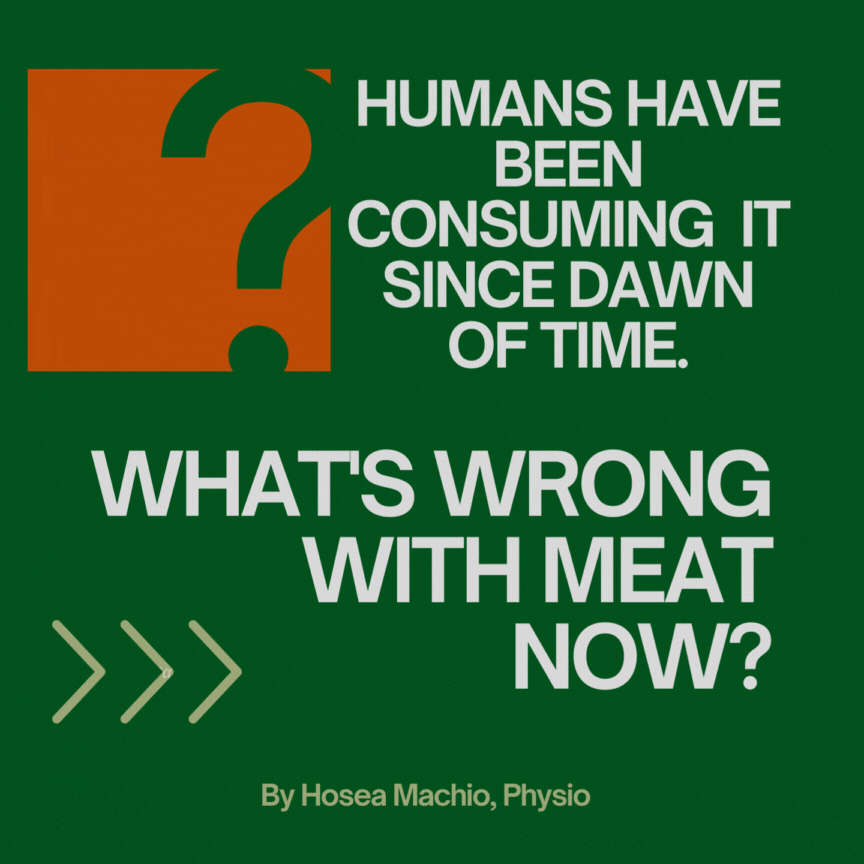You’ve probably heard it before: meat is bad for you.
Meat causes cancer. Meat causes heart disease. Meat causes diabetes.
But is that really true?
Or is there more to the story than “meats” the eye?
I know some of you meat naysayers, activists and vegetarians are already grunting your teeth
But don’t worry; I’ll support my claims, and besides, the level-headed ones will hear me out.
But first, let me tell you a little bit about myself.
I’m a meat lover. I always have been.
Ever since I was a kid, I enjoyed eating meat in all its forms: beef, pork, chicken, lamb, you name it.
I never had any health problems related to meat consumption.
Except for red meat, I was allergic. Eating meat was painful until high school.
It runs in the family, starts while young but fades in teenage years.
Other than that, I felt great. I had energy, strength, and vitality.
But then, I started hearing all these negative things about meat.
How it was killing me slowly. How it was destroying the planet. How it was unethical and cruel.
I was confused. I didn’t know what to believe.

So I decided to do some research.
I wanted to find out the truth about meat and its effects on health.
And what I found surprised me.
It turns out that most of the studies that link meat consumption to chronic diseases are flawed.
They are based on epidemiological studies, which are studies that observe large groups of people and their diets, lifestyles, and health outcomes.
But these studies have some serious limitations.
They rely on self-reported data, which can be inaccurate or biased.
They cannot prove causation, only correlation.
They may not account for other factors that affect health, such as genetics, environment, or quality of food.
For example, one of the most famous studies that claimed that meat causes cancer was the China Study.
This study analyzed the dietary habits and disease rates of rural Chinese people.
It found that the more animal products they ate, the higher their risk of cancer.
But this study had many flaws.
It ignored the fact that the Chinese people who ate more animal products also ate more processed foods, smoked more, drank more alcohol, and had less physical activity.
It also ignored the fact that the animal products they ate were not the same as the ones we eat in the West or other parts of the world.
They were mostly from low-quality sources, contaminated with toxins, hormones, and antibiotics.
So, the China Study was not a fair comparison of meat and plant-based diets.
It was a comparison of unhealthy and healthy lifestyles.
And that’s not the only study that was misleading.
There are many other studies that have similar problems.
They fail to distinguish between different types of meat, such as red meat, white meat, processed meat, and organic meat.

They fail to consider the quality and quantity of meat consumption, as well as the overall dietary pattern.
They fail to adjust for confounding factors, such as smoking, drinking, exercise, and stress.
They fail to account for individual differences, such as genetics, metabolism, and gut microbiome.
In other words, these studies are not reliable.
They do not prove that meat causes disease.
They only show that there is a weak association between meat consumption and disease risk, which could be due to many other factors.
But what about the benefits of eating meat?
Is there any evidence that meat can actually be good for you?
Yes, there is.
Meat is a rich source of protein and several vitamins and minerals, including vitamin B12, iron, zinc, and selenium.
These nutrients are essential for your health and well-being.
They support your muscle and bone strength, brain health, immune system, and energy levels.
They also prevent anemia, infections, and cognitive decline.
Meat also contains high-quality protein, which is more satiating and thermogenic than plant-based protein.
This means that eating meat can help you feel full longer and burn more calories.
This can help you with weight management and body composition.
Meat also provides essential amino acids, such as leucine, which are important for muscle growth and repair.
This can help you with athletic performance and recovery.
Meat also contains creatine, which is a natural substance that helps your muscles produce energy.
This can help you with strength and power.
Meat also contains carnitine, which is a natural substance that helps your body transport and use fat as fuel.
This can help you with fat loss and metabolic health.
Meat also contains taurine, which is a natural substance that helps your heart, brain, and eyes function properly.
This can help you with cardiovascular health, mental health, and vision.
Meat also contains conjugated linoleic acid (CLA), which is a natural fatty acid that has anti-inflammatory, anti-cancer, and anti-obesity effects.
This can help you with inflammation, cancer prevention, and weight control.
Meat also contains heme iron, which is a type of iron that is more easily absorbed and utilized by your body than plant-based iron.

This can help you with iron deficiency, which is a common problem among vegetarians and vegans.
Meat also contains vitamin B12, which is a vitamin that is only found in animal products.
This can help you with anemia, nerve damage, and cognitive impairment, which are common problems among vegetarians and vegans.
As you can see, meat has many health benefits that are often overlooked or ignored.
But not all meat is created equal.
There are different types of meat, and they have different effects on your health.
The quality and quantity of meat consumption also matter.
So, how can you eat meat in a healthy way?
Here are some tips:
- Choose lean cuts of meat, such as chicken breast, turkey breast, pork loin, sirloin steak, and lamb chops. Trim off any visible fat and skin before cooking.
- Choose grass-fed, organic, and hormone-free meat, if possible. These types of meat are more nutritious and less contaminated than conventional meat.
- Choose fresh, unprocessed meat, rather than processed meat, such as bacon, ham, sausage, hot dogs, and deli meats. Processed meat is high in salt, sugar, preservatives, and additives, which can increase your risk of disease.
- Choose moderate portions of meat, rather than large portions. A serving size of meat is about 3 ounces, or the size of a deck of cards. You don’t need to eat meat every day, or at every meal. Aim for 2-3 servings of meat per week, or less.
- Choose a variety of meat, rather than sticking to one type. Different types of meat have different nutrients and benefits. For example, red meat is high in iron and zinc, while white meat is high in selenium and vitamin B6. Try to include fish, eggs, and dairy products in your diet, as they are also good sources of animal protein and other nutrients.
- Choose healthy cooking methods, such as baking, roasting, grilling, broiling, or steaming. Avoid frying, deep-frying, or charbroiling, as these methods can create harmful compounds, such as heterocyclic amines (HCAs) and polycyclic aromatic hydrocarbons (PAHs), which can increase your risk of cancer.
- Choose healthy accompaniments, such as vegetables, fruits, whole grains, nuts, seeds, and legumes. These foods can provide fiber, antioxidants, phytochemicals, and other nutrients that can balance out the effects of meat and enhance your health. Avoid eating meat with refined carbs, sugar, and fat, such as burgers, fries, and sodas, as these foods can increase your risk of disease.

Summary
Meat is not the enemy.
It can be a part of a healthy diet, as long as you choose the right type, amount, and quality of meat, and eat it with other wholesome foods.
Meat can provide you with protein, vitamins, minerals, and other nutrients that are essential for your health and well-being.
Meat can also help you with weight management, muscle growth, energy production, and disease prevention.
But meat can also be harmful, if you eat too much, too often, or the wrong kind of meat.
Meat can increase your risk of chronic diseases, such as cancer, heart disease, and diabetes, if you eat it with processed carbs (KFC or with soda), sugar, and fat, or if you cook it in unhealthy ways.
So, the key is moderation and balance.
Eat meat, but not too much, and not too often.
Eat meat, but not alone, and not with junk food.
Eat meat, but with variety, and with quality.
That’s how you can enjoy meat and your health.
If you have any feedback, please leave a comment below.
I’d love to hear from you.
And if you liked this blog post, please share it with your friends and colleagues.
Have a great “meaty” day!
P.S. How do you eat your Steak?


Leave a comment